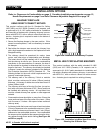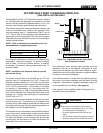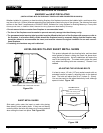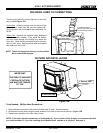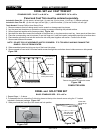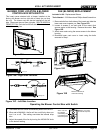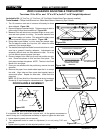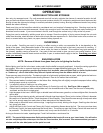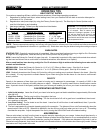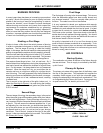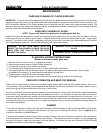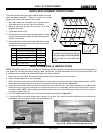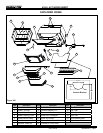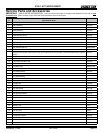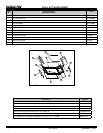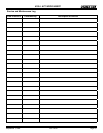
4100-I ACT WOOD INSERT
Page 18
September 1, 2008
R
250-7201E
1. Leave fan off until your insert is hot and a good coal bed is established, approximately 0 minutes
after fuel is lit.
2. The fan may be left on throughout the burn.
. The fan should be left off until a good burn is established, then turned
on a medium or high rate.
4. The fan tends to cool the insert. Leave fan off until the burn is well established; then, if you wish,
turn the fan on at a low rate.
5. The fan is equipped with a rheostat (speed control) with a snap disc. The blower will turn on/off automatically when the
speed control is set to AUTO. When set to MANUAL, the fan will turn on/off only when you turn it on or off. This setting
overrides the snap disc. Adjust the speed of the fan by turning the HIGH/LOW knob to the desired setting.
Remove cold ashes (not hot) from the insert at regular intervals, depending on your usage. Ashes should be placed in a
metal container with a tight tting lid. The closed container of ashes should be placed on a non-combustible oor or on the
ground, well away from all combustible materials, pending nal disposal. If the ashes are disposed of by burial in soil or
otherwise locally dispersed, they should be retained in the closed container until all cinders have thoroughly cooled. Always
treat ashes as if they contain hot coals.
ASH REMOVAL
FAN OPERATING INSTRUCTION
S
BTU / Hr
Below 10,000
10,000 - 15,000
15,000 - 0,000
Maximum Heat
Start-Up Air Control
Closed after 5 to 15 minutes
Closed after 5 to 15 minutes
Closed after 5 to 15 minutes
Closed after 5 to 15 minutes
Primary Control
Pull to Stop
1” - 1-1/4” open
1-1/4” - 2-1/2” open
Fully open
BURN RATES
STARTING FIRE: Open both controls (push in) completely. After a wood load has been burning on high for 5 to 15 minutes
or longer for very large pieces, close the Start-Up Air Control (bottom rod) by pulling it out.
HIGH: Leave the Primary Air Control fully open (top rod). It is especially important to fully open both controls when reload-
ing the insert as failure to do so could result in excessive emissions, also referred to as ‘opacity’.
controls as listed below:
MEDIUM HIGH: Close the Primary Air Control to 1-1/4” to 2-1/2” (2mm to 64mm) open. Start-Up Air is closed.
MEDIUM LOW: Close the Primary Air Control to 1” to 1-1/4” (25mm to 2mm) open. Start-Up Air is closed.
LOW: Gradually close down the Primary Air Control by pulling out making sure to maintain ames in the insert. (Start-Up
Air is closed). It is very important to maintain ames in your insert during the rst few hours of a low burn to avoid exces-
sive air pollution.
OPACITY
Opacity is the measure of how clean your insert is burning and is measured in percentages. An opacity of 100% in the
smoke column from a chimney will totally obscure an object. Whereas 0% opacity means that no smoke column can be
seen. A periodic check of the opacity emitted from your chimney will enable you to burn your insert as smoke free as pos-
sible.
WARNING: Do not operate with Start-Up
Air Control in the open position in excess
of 15 minutes! Risk of extreme tem-
peratures! Prolonged operation of this
unit with the Start-Up Air Control in the
open position may cause the combusti-
ble materials around the stove to exceed
safe temperature limits.
OPERATING TIPS
HEAT OUTPUT RATES
For maximum operating efciency with the lowest emissions, follow these operating procedures:
1. Regardless of desired heat output, when loading insert, burn your Quadra-Fire with both air controls wide open for
a minimum of 5 to 15 minutes.
2. Regulate burn rate (heat output) by using the Primary Control (top rod). The Start-Up Air Control (bottom rod) is
used for initial start-up and reloading.
. Heat output settings: Follow burn rate instructions listed below.
4. Burn only dry, well-seasoned wood.
*NOTE:
These are approximate settings, and will vary with type of wood or chimney draft. Due to altitude and other environmental
circumstances, this operational information is a guideline only. Similar burn rates may be obtained using other settings unique to
your situation.



